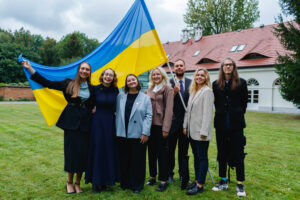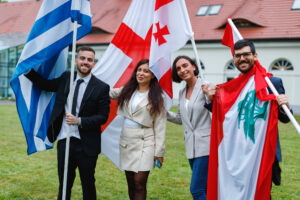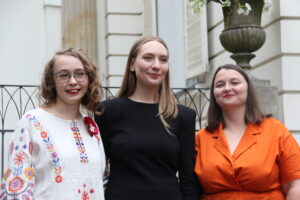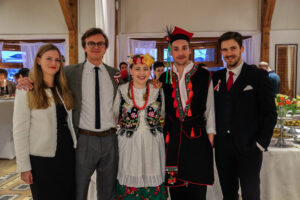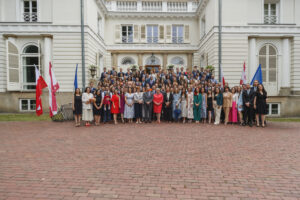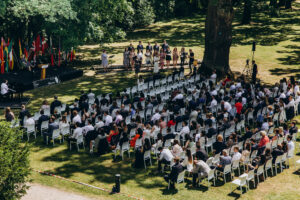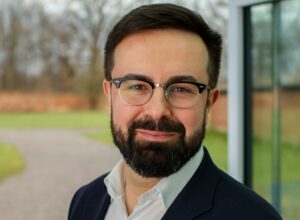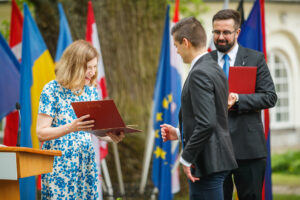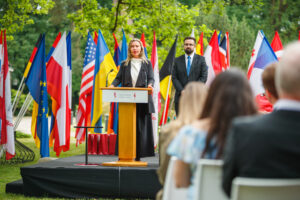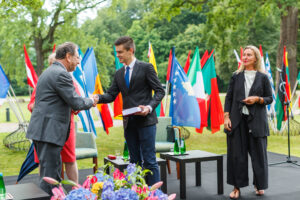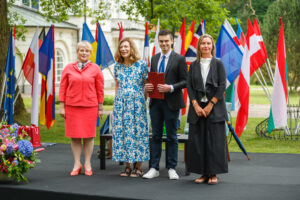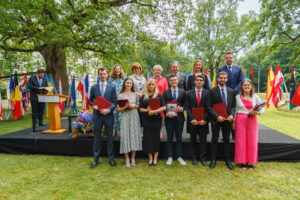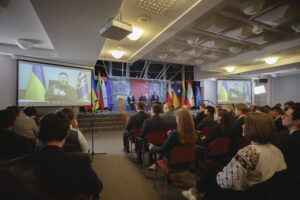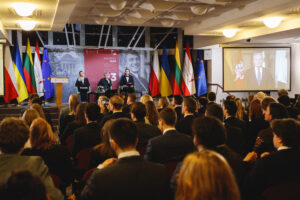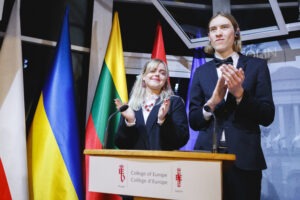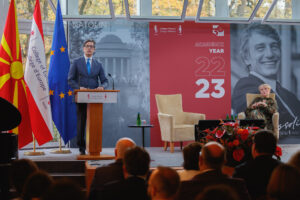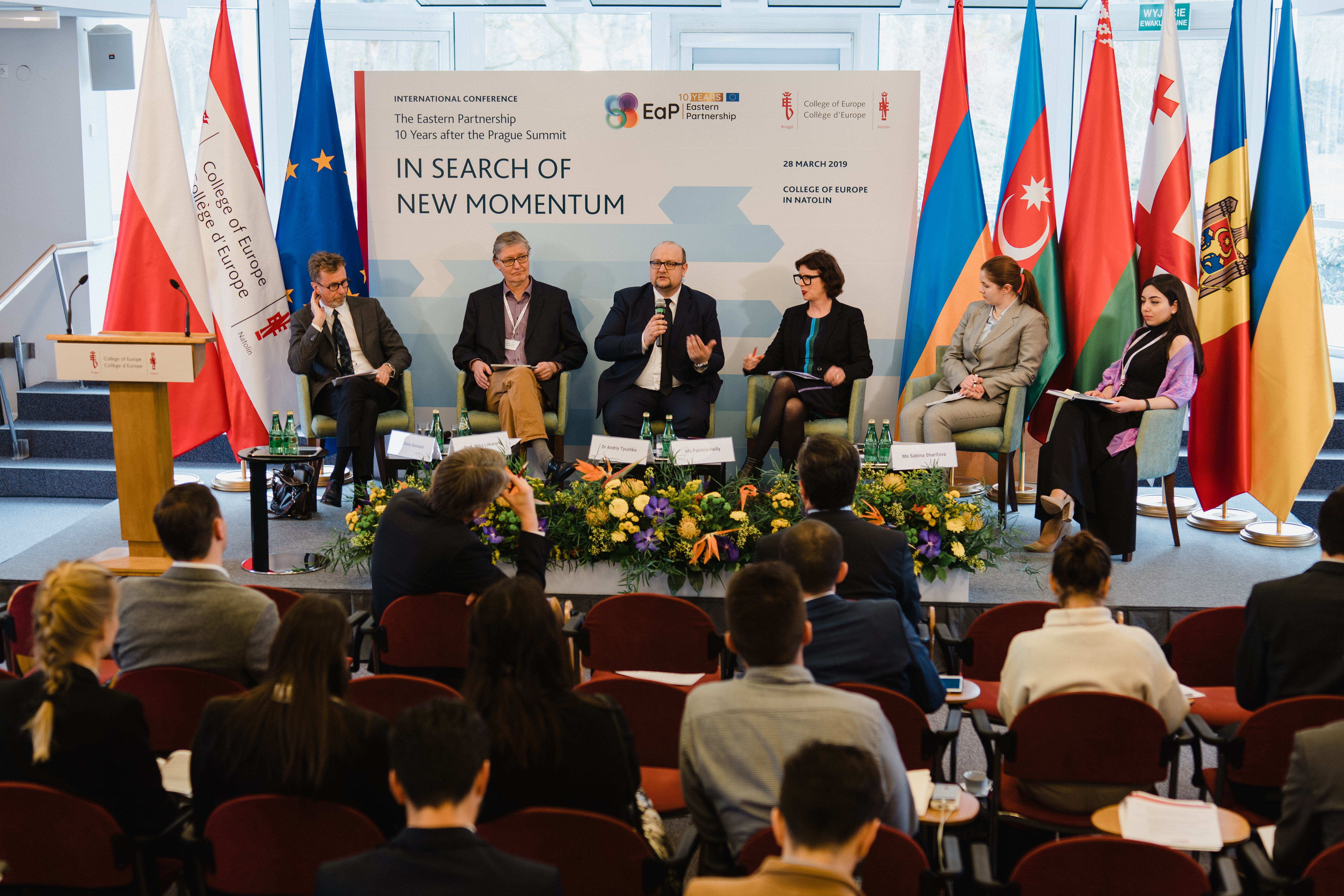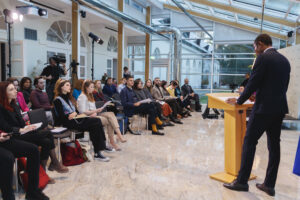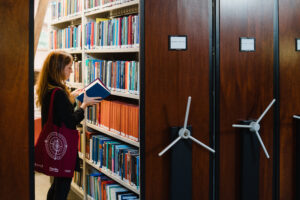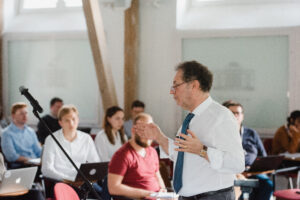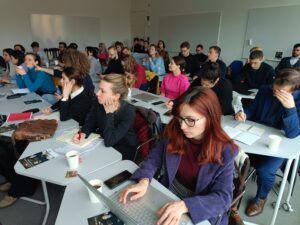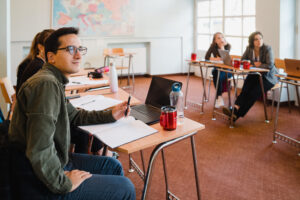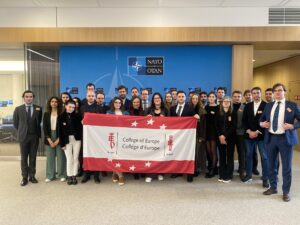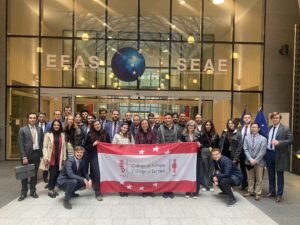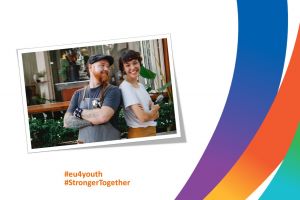
‘I always wanted to study again’: how to get an education in the EU and change your country for the better
“It has been challenging for me as I hadn’t been studying for 10 years and my previous education was in a completely different field,” says Oleksandra Lysa from Ukraine, who graduated this year at the College of Europe in Natolin (Warsaw), Poland, thanks to the EU4Youth programme.
Oleksandra is one of about 40 scholarship holders from the Eastern Partnership countries who have benefited from this opportunity during the three editions of the programme.
“The uniqueness of the offer we present at the College of Europe in Natolin, is that we prepare the students from the Eastern Partnership countries to think beyond disciplinary boundaries, beyond certain preconceptions, and encourage them to build bridges and embrace a wider perspective on Europe, on the EU, but not only, as well as on global affairs,” explains Jakub Kubica, Head of Communications and Cultural Programmes at the College of Europe in Natolin.
Students follow an Advanced Master of Arts in European Interdisciplinary Studies, focusing on the internal and external dimensions of the EU, and on specific thematic areas such as migration, digital and energy transition, as well as on combating disinformation in the context of Russia’s war against Ukraine.
Graduates note its importance for the development of their home countries, as the institution has accumulated a high-level expertise in precisely the matters of EU enlargement and EU cooperation with its neighbours.
“I decided to apply for the programme because of the ripple effect created by the people who inspired me. I wanted to push my limits and acquire more skills so that I could return to Moldova and add value to the European integration path of my young country – a country whose integration is now more important than ever, given the uncertainty in the international sphere,” said Ianina Japalau from Moldova, who lived in Romania for six years and completed her Bachelor’s and Master’s degrees there.
Why the programme offers a unique opportunity
In practice, this is a 10-month postgraduate course on European Interdisciplinary Studies, which is offered to graduates of universities, holders of either a Master’s or a four-year Bachelor’s degree. The idea is to bring together people from very different backgrounds, such as international relations, law, political science, economics, languages, history, journalism, and even students with STEM profiles, such as medicine or biology. The main requirement is to be interested in European affairs (broadly conceived), the functioning of the European Union, and the history and mechanisms of European integration.
As for the structure, the first semester serves to give students a fundamental understanding of the process of European integration. The second semester serves to give a deeper view, with students choosing one of four specialisations: EU Public Affairs and Policies; the EU and the World; the EU and its Complex Neighbourhoods; or European History and Civilisation.
“The College of Europe is famous for its ‘flying faculty’, which means visiting academics and practitioners come to teach here from across Europe and beyond. The programme includes two study trips to the EU and its neighbourhoods. Students come from approximately 30 different countries, and national days are held on campus to help you familiarise yourself with different cultures. This academic programme is unique compared to my home university because of its interdisciplinary approach and the opportunity to learn from experts in the field,” added one of the alumni, Tsisana Nemsitsveridze from Georgia.
For the evaluation system, there are two exam sessions in the year, with approximately five to seven exams in each. The marking system is the francophone system (Belgian/French), with marks out of 20. And the study trips mentioned by Tsisana also contribute ECTS credits towards the degree.
“The formats of exams were totally new for me. I had never had open-book or take-home exams before. It was interesting to discover those formats, however, I think I still prefer oral or closed-book exams,” says Oleksandra Lysa from Ukraine.
Finally, the students have to write a Master’s thesis, which in terms of length is closer to a Bachelor’s, at 12,000 to 18,000 words.
“One important note for your thesis: choose a topic on which you already have some knowledge, it will save you time on researching something completely new, and really try to start it early, do not wait until the second semester,” Oleksandra advised.
One crucial component is the constant communication with decision makers, NGO representatives, media and academics from the universities. “On top of that, we have a number of extracurricular activities. For example, visits from heads of state. Just this year, we’ve had, initiated by our students, a live video link with President Volodymyr Zelenskyy, who answered questions from our students. Also, the President of Lithuania Gitanas Nausėda sent his video greetings. Moreover, we had the President of Montenegro on campus, and the president of North Macedonia opening the academic year,” said Jakub Kubica.
Admission guidelines and benefits
Online applications for the academic year 2024/25 are now open until 16 January 2024. More details on applications are available here.
Applicants must have finished an MA or four-year BA degree. Candidates must then submit a formal online application for admission. The full guidelines can be found here, but it is also important to meet the language requirements. The working languages are English and French, and applicants should have a B2 minimum level for one working language and a B1 minimum level for the other.
There are no quotas for countries. As the organisers say, they try to keep the student body as diverse as possible. The lowest age of acceptance is 21. “One important point is that you can apply already in the last year of your studies. For example, we’re going to open the applications in October, and the process lasts until mid-January for the next academic year. Students who will enter their final year of studies in autumn 2023 can start applying for the academic year 2024/25 as early as this coming October,” explains Jakub Kubica, the Head of Communications and Cultural Programmes at the College of Europe in Natolin.
As for the age limit for applicants, of course, the EU4Youth programme itself is aimed at young people under the age of 35. But this is not the only scholarship scheme that is offered at the College of Europe. Depending on the country, the College of Europe lists a range of scholarships available for students from EaP countries.
In today’s challenging times, young people also choose education for the opportunities and benefits it offers. In addition to the education offered by the course itself, there is a strong network that supports graduates, with the College of Europe boasting almost 18,000 alumni.
“According to our internal statistics, 90% of graduates find their first paid internship or their first paid job within three months of graduation. Of course, while the students are at the College, they’re offered the opportunity to consult with our career specialists, they’re offered professional trainings, and we also build contacts with companies and institutions,” Jakub Kubica said.
He also noted that when graduates apply for a position related to the EU, they rarely have to explain what the College of Europe is. “I would say the College of Europe is a clear and recognisable brand in the field,” Kubica added.
In total, over 30 years of existence of the Natolin campus, almost 340 students have studied here from the Eastern Partnership countries. And in the last three academic years, they have been able to benefit from this additional scholarship scheme under the ‘EU4Youth Phase III Youth Employment and Entrepreneurship’ programme, co-funded by the EU and the Ministry of Foreign Affairs of Lithuania and implemented by the Lithuanian Central Project Management Agency (CPMA) in the Eastern Partnership countries (Armenia, Azerbaijan, Belarus, Georgia, Moldova and Ukraine). The scholarships cover tuition fee, full board and lodging on campus.
“Don’t be afraid to apply!”
We asked this year’s alumni about their advice on the application process, and share it below:
“Once you have taken this step, you will be sitting at a table with the most enlightened minds – students, professors and high-level representatives, who will offer you the opportunity to share your ideas and discuss topics that may be under the radar, with the ultimate aim of giving you the courage to act. The people and the educational process will offer you clarity, but at the same time it will make you understand how to question everything through an analytical lens.”
Ianina Japalau (Moldova). She has two Bachelor’s degrees (one in European Studies) and a Master’s degree. She also took part in the Erasmus+ programme before her experience in Natolin.
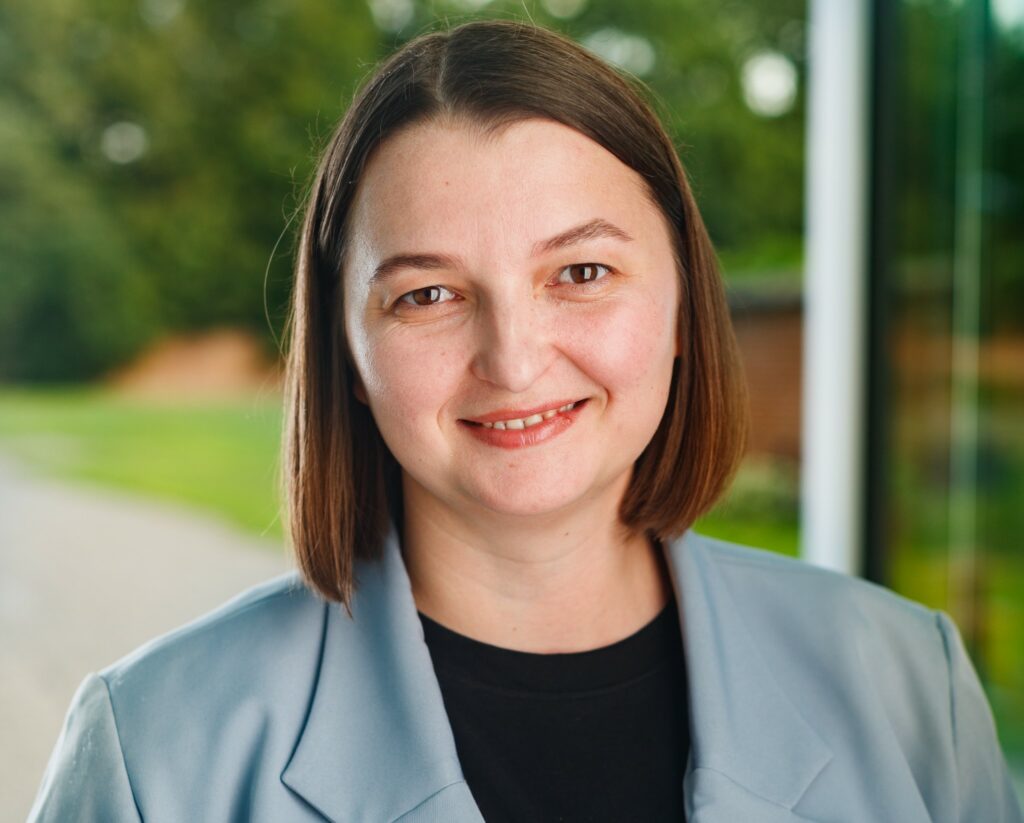
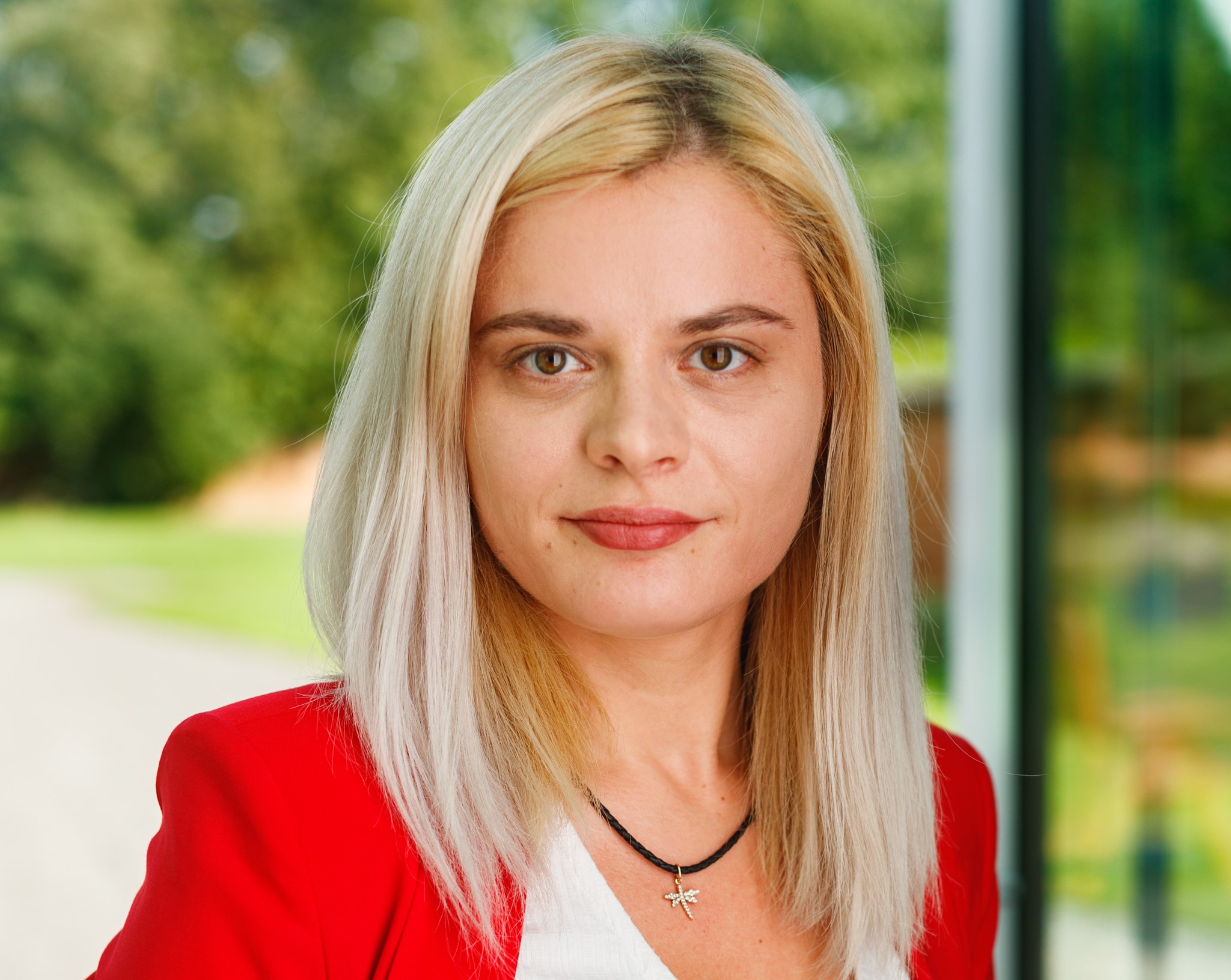
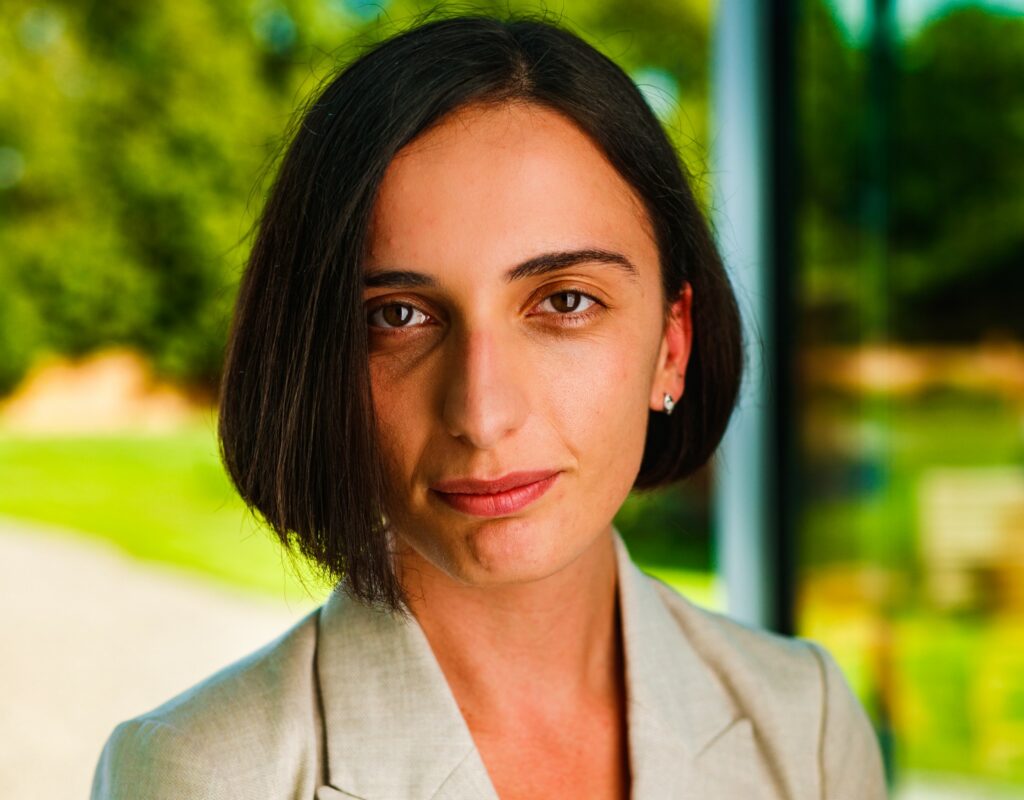
“Do not be afraid, do not let the lack of knowledge of the French language (or something else) stop you from applying. Be curious, use the opportunity to communicate with people from so many different countries, and learn languages.”
Oleksandra Lysa (Ukraine). She gained her last degree in 2012 and before applying built a career in the field of civil society organisations and local government in Vinnytsia.
“If you’re interested in applying for the programme, my advice would be to study hard. However, don’t forget to balance your educational process with your social life. The Natolin campus experience is unique and the friends you make there will last a lifetime.”
Tsisana Nemsitsveridze (Georgia). She earned a Bachelor’s degree in International Law from Tbilisi State University in 2019 and worked at the Public Service Development Agency’s Department of Citizenship and Migration.
Author: Olga Konsevych
Article published in Ukrainian by Tsn.ua
The EU4Youth programme has just launched nine projects to enhance youth employment and entrepreneurship in the Eastern Partnership. The projects support the creation of networks and partnerships between youth-focused organisations and the creation of innovative tools that offer flexible learning opportunities for young people, helping them to acquire new skills and knowledge at their own pace. This could be particularly useful for those who may face geographical or financial constraints.
MOST READ
RELATED PROJECTS
SEE ALSO

No, time is not on Russia‘s side
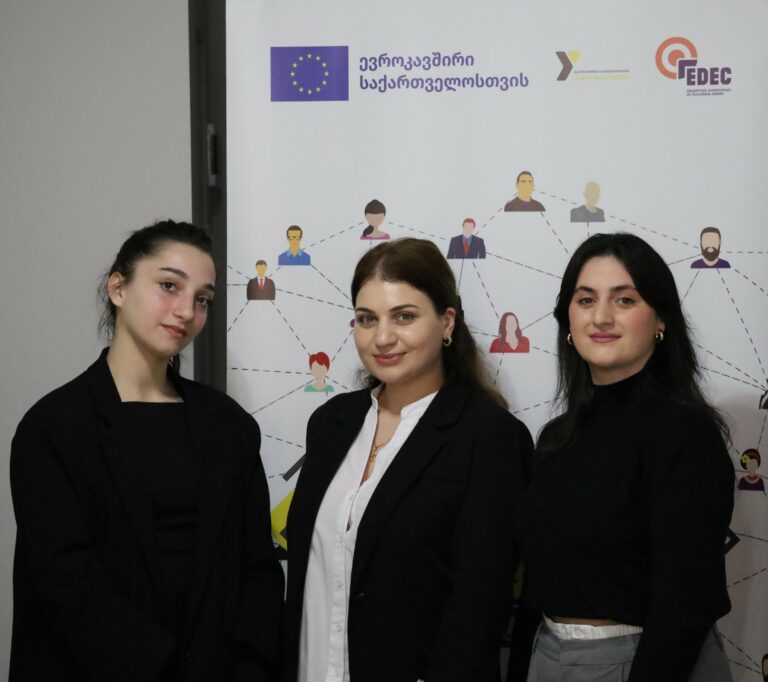
A hands-on approach to boost youth employment in Georgia
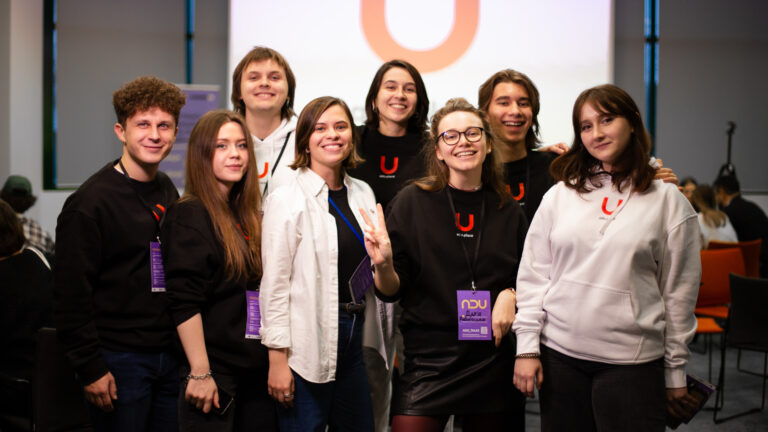
Great opportunities even if you have no money: what the EU offers Belarusian teachers and students
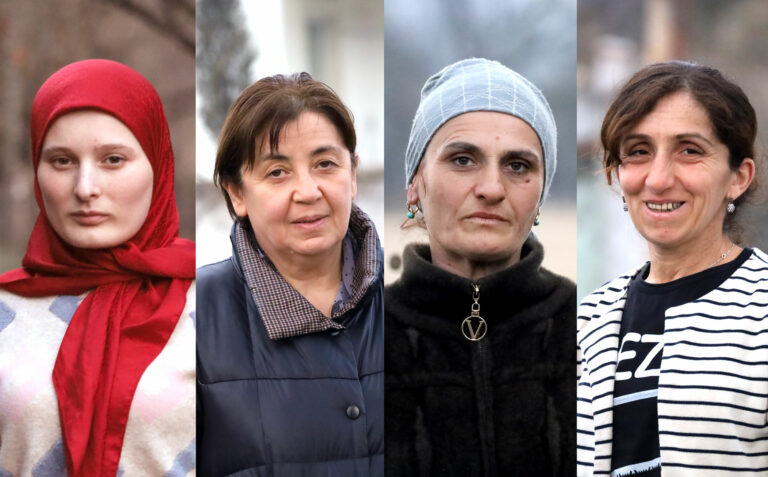
Taking health into their own hands: women’s empowerment in the remote villages of Georgia
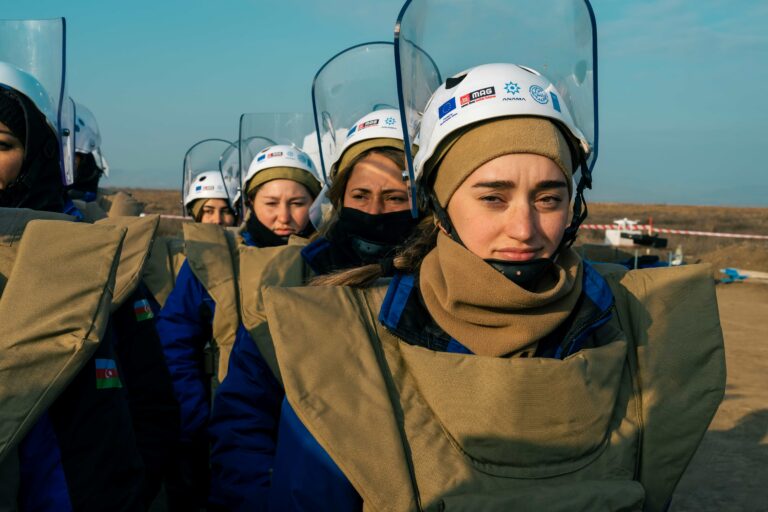
I have no regrets: the Azerbaijani women trained to clear mines
More campaign pages:
Interested in the latest news and opportunities?
This website is managed by the EU-funded Regional Communication Programme for the Eastern Neighbourhood ('EU NEIGHBOURS east’), which complements and supports the communication of the Delegations of the European Union in the Eastern partner countries, and works under the guidance of the European Commission’s Directorate-General for Neighbourhood Policy and Enlargement Negotiations, and the European External Action Service. EU NEIGHBOURS east is implemented by a GOPA PACE-led consortium. It is part of the larger Neighbourhood Communication Programme (2020-2024) for the EU's Eastern and Southern Neighbourhood, which also includes 'EU NEIGHBOURS south’ project that runs the EU Neighbours portal.

The information on this site is subject to a Disclaimer and Protection of personal data. © European Union,
